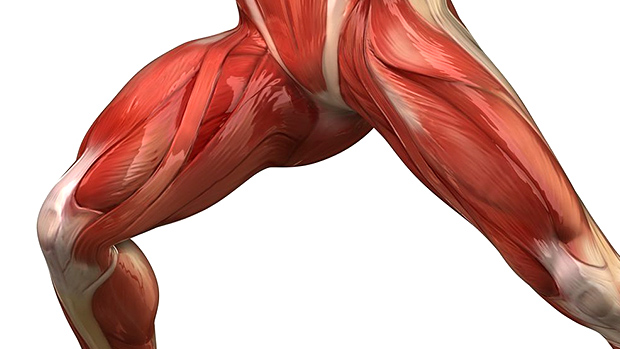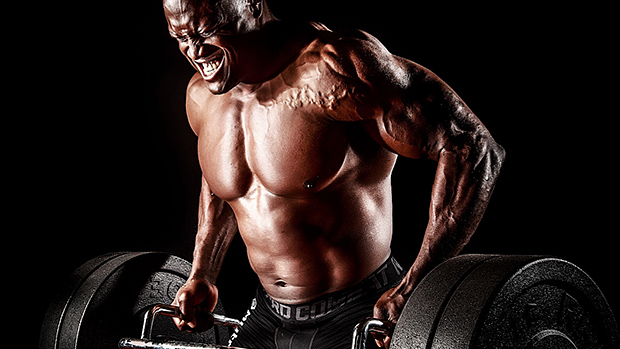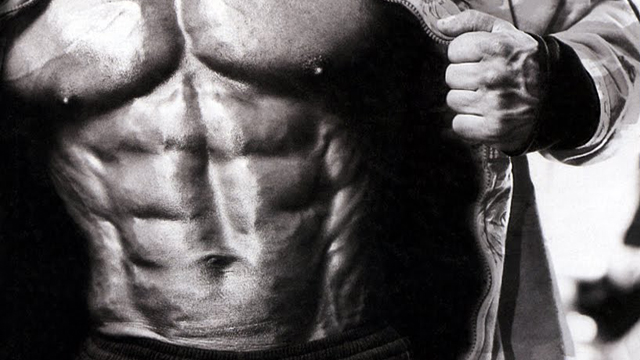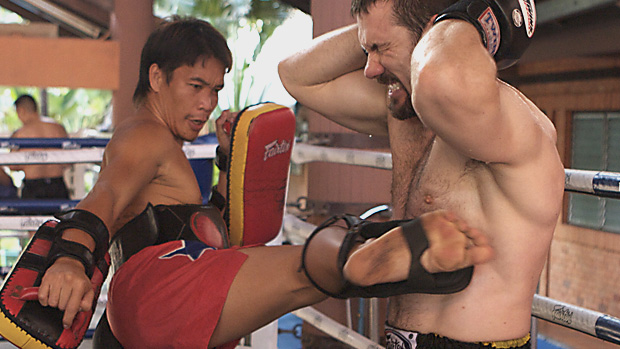The Question
What's the most hard-to-hear advice that lifters need to hear anyway?
Lift lighter weight.
This advice is mostly for bodybuilders, physique competitors, and the general lifter who wants to simply look good. Unless you're chasing powerlifting records, most guys lift heavier than what's necessary for muscle growth. I get it because I was once that guy, but moving weight from point A to point B with less than perfect form serves little more than our egos.
Stop trying to impress your gym bros. Married or single, I'm sure your girl cares more about how you look physically than how much you bench. Seriously, when was the last time a chick asked you that question? In all my 25 years of pushing iron I've never had a girl ask me how much I bench press.
Master each lift by eliminating momentum and controlling the eccentric (negative) phase of the rep. Yes, you'll be forced to swallow your ego and lift lighter weight, but the end result will be fewer injuries and a more muscular physique. - Mark Dugdale
Don't prepare for a competition you have no business doing.
I'll be the first one to say that training with a specific goal in mind will increase your level of dedication and effort. But that goal must be realistic and, more importantly, conductive to both short and long term success.
Thanks to social media (where everybody wants to be a star) and the multiplication of classes in physique sports – they now have the "wellness" class for God's sake... basically slightly above average folks – it seems like everybody wants to do a show, but here's the truth:
- Few people have business doing a show.
- Doing a show can limit your gains and lead to serious psychological issues.
A young guy came to me to train him for a bodybuilding show. I like the guy. He's passionate about training, trains super hard, and is very smart. But he's only a not-so-lean 160 pounds and about 5'10". He looks like your average young gym rat. He doesn't stand out among the average Joes in the gym.
Here's the thing: if you're not even the best physique in your gym, or at the very least among the top three, why are you even thinking about competing? You shouldn't. Unless you very clearly stand out in your average-bro gym, you have no business competing in a sport that compares the best physiques from many gyms.
"Yeah, but once I'm ripped I'll stand out."
Dude, being 140 pounds ripped at 5'10" is not bodybuilding. Yes, you'll have lines and definition but the whole spirit of this activity is to be lean and muscular. Not thin.
"I'll do a steroid cycle for the show."
Right, try to cure one stupid thing with a second stupid thing. Good move. Listen, I'm not against drugs. But if you've never used them before you began thinking about a show, you're crossing a line you can't come back from. You're wanting to do something that could have health consequences just so you can do a show? That fact alone tells me that you have no business doing a show!
And steroids aren't magic. Yes, they'll help, but taking them to prepare for a show will actually limit your gains because you're dieting down. They'll help you preserve muscle mass and probably add some since it's your first cycle. So instead of being 140 pounds ripped, you'll be 150 ripped. Big deal. You'll still have no business on stage. Be realistic.
Doing a physique show isn't something you decide to do lightly because it can have consequences. I know plenty of people who developed eating disorders because of a contest prep. Your social life will take a turn for the worse. Your love life could very well be affected (I know several friends of mine who broke up because of a contest prep) and many can suffer psychologically after the contest.
Either you hurt yourself physiologically trying to stay in contest shape year round once you achieved it, or you suffer psychologically because of the weight regain. I know a ton of people who ended up looking worse a few months after their show than they did when they started out. Can you imagine the psychological distress once you've seen yourself super lean?
Be objective. If you have the potential to be a good competitor, go for it! I trained a girl with the only goal of getting leaner and after a while it was clear she had potential. Great leg separation, superb back, good abs. She had what it takes to compete and win. When she came up to me asking to compete I told her to go for it.
But I also turned down many people I know didn't have what it takes yet. Maybe someday they will. But building the amount of muscle needed to do well in bodybuilding or figure takes time. If you don't have it before you decide to do a show, it won't magically happen during that preparation.
Some people love contest prep. But for others it's hell and makes them want to stop training. Some bodies handle the rigors of a preparation fairly well; others will have bad consequences (even when natural). I know girls who had long lasting estrogen and thyroid issues after a contest and guys who tanked their testosterone and suffered from erectile dysfunction for a many months.
Unless it's obvious that you have all the tools to do well, please don't do a show. - Christian Thibaudeau

Just about any body composition problem you have is a diet problem, not a training problem.
Pick any good workout program. It doesn't matter if it's a pure bodybuilding program for mass, a pure strength program, or a training plan designed to get you ripped.
Got it? Okay, here's the thing: you can get fat or lose fat on any of those workout plans. Your results will depend almost entirely on the foods you're eating. Think about it like this: Training is the car. Diet is the steering wheel.
A muscle-building workout isn't going to take you anywhere unless you steer growth with supportive foods. A fat loss workout is going to stall out and leave you stranded if paired with an incompatible eating plan... unless you were a total couch potato before you started training, and even then you'll hit a wall if you're not steering.
What if you have no basic dietary principles? You know, like some general rules you follow when it comes to food, but not necessarily a "diet." Well, then no one is at the wheel of your car.
Now, you're thinking, "Duh, that's obvious!" But is it? Diet is the hard part. Training – even those grueling, crap-a-kidney workouts – are at least satisfying and fulfilling. Not eating something you really want to eat doesn't exactly get your endorphins pumping. So we ignore the diet part. Or at least we try everything else first. We'd rather train harder than eat smarter.
But diet is magical. A few better foods eaten consistently, a couple hundred fewer calories, a couple hundred MORE calories in some cases... abracadabra, results! And all without changing your training (assuming "training" means more to you than taking a slow walk on the treadmill).
Now, you can and should change your workouts if you have a specific goal in mind. But if you're training hard and being consistent and you still have a problem – too fat, too skinny, no muscle gain, strength stalled etc. – then it's a diet issue.
Most people would rather not hear that because eating is emotional, habitual, social, and psychological as well as physiological. It's tough to get your nutrition plan right, and it takes time to master that side of the good-body equation. You'll have to crack a book, read plenty of T Nation articles, and experiment.
But the work is worth it. In fact, it's probably the most important aspect of fitness. Take the wheel and floor it. - Chris Shugart
Sometimes you have to look worse to look better.
What I mean by this is that you look your best when you're lean. After that first successful diet every lifter feels like a god. They're itching for any excuse to take their shirt off and display their six-pack.
Once you've gotten really lean it changes your perception of what good shape is. Being shredded is intoxicating and you want it to last forever. The problem is it can't. Well, not if you want to add a noticeable amount of muscle to your frame.
After dieting down that first time, most lifters make the mistake of thinking they can just pack on muscle while staying shredded. Unfortunately, those mythical lean gains are exactly that – a myth. If you chase these lean gains then you'll end up spinning your wheels, gaining little-to-no size.
Are you happy to retain a lean, but only vaguely muscular physique? Cool. The lean gains approach might suit you. Want to be big and ripped? Then you need to take a smarter approach.
If you want to pack on a considerable amount of size then you need a sustained calorie surplus. With this comes an increase in scale weight, muscle mass, and a little fat. There's no avoiding it. After the newbie gains have run their course you simply cannot add slabs of muscle without some fat gain.
You don't have to get fat and sloppy, but you must accept that some fat will be accumulated along the way. The key is to keep the ratio of muscle to fat as high as possible. If you do this, then when you diet next time around you'll look far better.
This is why a phasic, or cyclic, approach to your training and nutrition is best – periods dedicated to gaining muscle or losing fat. During your bulk you won't look so good with your shirt off, but you will look bigger in a T-shirt. So, plan accordingly, bulk during the winter months and diet when summer is on the horizon.
Done right, this strategy can dramatically change your physique. It takes time, effort and consistency, but patience is a muscle-building virtue, and if you follow this plan you'll temporarily look worse to eventually look way better! - Tom MacCormick
Go to the gym even when you don't want to.
You get out of bed every morning, put on some clothes, eat breakfast, and go to work. You don't wake up and ask yourself, "Should I get out of bed today? Should I eat or not? Should I just stay home and not go to work?"
No, you just do these things because they're habits, ones that get you where you want to be. If this is true, then why does the question, "Do I really want to train today?" ever enter your mind?
The one thing more than anything else that'll get you where you want to be, fitness wise, is consistency. Missing days in the gym because you're tired and unmotivated is THE best way to get absolutely nowhere with your training. Going to the gym every day and NOT thinking about whether you want to or not, is how you to reach your fitness goals.
So how do I make a habit of going to the gym? Try this: Stop thinking about it for 2-3 months. Be a fitness machine and go 4-5 days a week without ever asking yourself whether there's a choice to go or not. Chances are, your brain will be rewired and a new habit will form. - Brian Henneberg

You're still too fat.
When I left powerlifting and decided to get my fat ass in shape, I worked with someone to hold me accountable through the process. After years of seeking nothing but weight on the bar, I made the shift to actually feel better and look better. And that phrase, "you're still too fat," was my feedback every week during check-ins. Even when I thought I was looking "pretty good," my feedback was "you're still too fat."
It drove me nuts. But he was right. And once I finally did get into decent shape, and I mean single-digit body fat, I finally earned the right not to hear that phrase.
Most lifters get a bicep vein or see the "top two abs in the morning" and think they're jacked or in shape. You're still fat. And yes, my view of "fat" is probably skewed from being immersed in the physique culture for thirty years, but it amazes me what people pass off as being "jacked" or "lean" because there's some hint of abs or a little vascularity.
The most common thing for lifters who finally do some body recomp is that they think they're 20 pounds away from being really lean or jacked. Most often it's about 40 to 50 pounds. And they don't like to hear that because lifters often value the scale as feedback that they're "really freakin' huge because I weigh X amount."
I don't care if you're 300 pounds if you're 25% body fat. You're fat. And if that fat came off you'd lose some muscle in the process because of how fat you are, and while you'd end up being far bigger than the rest of the population, you're still not as big as you've built yourself up in your mind.
If you're just chasing numbers on the bar and don't mind being a fat slob, that's totally your call. But if you're trying to get in better shape and actually get jacked then repeating "you're still too fat" until you can honestly say "I'm really lean/jacked/in shape" is some great tough love to give yourself. - Paul Carter
Consistent, hard work is more important than the specific method or program that you use.
Assuming your methods aren't completely asinine, almost any method works as long as you do. When you examine the methods of the leading performers in everything from weightlifting to bodybuilding, you'll be hard-pressed to find much in the way of common training methods: some train every day, others three times a week. Some prefer free weights, others machines or bodyweight drills. Some use high volume, others prefer high intensity. You get the picture.
What great athletes (and high-achievers in any field of pursuit) do have in common is the willingness to do long-term consistent, hard work.
Of course, when we fail to make the type of progress we hoped for, it's much more appealing to assume your method is the culprit, and hey, sometimes it is. But more often than not, it's the way you apply yourself to the method that warrants greater scrutiny. - Charles Staley
You may not be making progress.
How many times have you been to a gym and seen anyone write anything down? I rest my case. It's easy to fall into the trap of training, putting in the effort, and feeling like each session was hard, so it MUST be getting to your goals, right? Not always.
If your goal is to deadlift 495 for a single, how much can you lift today for a single? For 5 reps? What about last week? Last year? Have those numbers gone up? What accessory lifts transfer to your 1 RM deadlift? It's easy to get lost in different rep ranges, new accessory lifts, and all the other noise.
Track what works for your body. Do that more. Nobody wants to hear that their current program isn't working, but that can be a powerful motivator. Track your progress and gather the data you need to get better. - Mike T Nelson, PhD

You're cheating on your diet.
This is an actual conversation I had with a bodybuilding client of mine:
Me: You're cheating on your diet.
Client: No, I swear, I'm not.
Me: Yes, you are.
Client: No, I'm eating everything on the diet, just like it says, to the gram!
Me: You're cheating.
Client: I'm not!
Me: Dude, I've been doing this for 30 years. I know what gets people lean. We've run the gamut from more food, less food, low carb, high carb, more cardio, less cardio, more fat and less fat because I've given you the benefit of the doubt. Now, after exhausting all avenues, and assuming you're still indeed a human, the only reason there is for you not getting lean is that you're cheating on your diet.
Client: I'm not.
Me: Your girlfriend told me you're eating chocolate chip cookies at work.
Client: Those are protein cookies! And they only have like six chips in them!
Me: They're not on your diet.
Client: What's one cookie going to hurt?
Me: It's not just one.
Client: Yes, it was!
Me: No, it wasn't.
Client: I swear I'm not cheating.
Me: I swear you are.
Client: I'm not!
Me: Then why aren't you getting leaner?
Client: Maybe I'm one of those people that doesn't respond to dieting?
Me: No, you're one of those people that responds to cheating on their diet.
Client: I'm not cheating!
I take out the content of his trash that I went through the night before and lay it out in front of him: three peanut M&M wrappers, two crumpled up McDonald's bags, and an empty box of Wheat Thins. He looks them up and down.
Client: Those aren't mine.
Me: They were in your trash.
Client: You went through my trash?
Me: Yes. I know you're cheating on your diet and I'm proving it to you.
Client: Those aren't mine.
Me: Who's are they?
Client: My girlfriend's.
Me: You're girlfriend is a vegan and she told me she hasn't been to your house in three days.
Client: I'm not cheating.
Me: Then you're not following your diet.
Client: But I'm not cheating.
Me: Whatever you want to call it. Either way, you're on your own, I quit.
Client: You can't quit! I have a show in six weeks!
Me: You're not going to be ready.
Client: What do you mean?
Me: What I mean is that because you're not following your diet you're not going to be ready for your show.
Client: But I paid you!
Me: No, you paid me up until now, assuming you were going to do what I told you. I'm not taking any more of your money if you can't follow your diet. Some people aren't cut out for this, bro. Dieting down to contest shape is one of the hardest things in the world. Not everyone can do it. You're obviously one who can't. You need to find another hobby.
Client: But I want to be a bodybuilder!
Me: And I want to be a Supreme Court judge. You have to accept it's not going to happen.
Client: I'll find a new coach.
Me: I'm sure you will. I can think of ten guys who will take your money and not give a shit. Good luck with that.
He found a new coach and six weeks later did the show. From the second he walked on stage it was very clear who had last place locked up – the fat guy. - John Romano
Lift for decades, not days.
Following a well-designed training program is useful and setting up a proper nutrition plan can make or break results, but there's one factor that's even more important and influences literally every single step you take towards your goal. It dictates how, when, and why you do everything. Ev-er-y-thing.
That factor is: Understanding that working towards your goal is something you'll be doing for the next few decades, not the next few months.
Sixty-day programs to improve your squat and super-focused 30-day fat loss plans are awesome and can definitely be effective. Just know that you're not really anywhere near "done" when they're over because, whether you recognize it or not, training is a long-term game. That's tough to remember in a time when social media minute-or-less videos are the norm and it appears that every guy "should" have striated delts and a 315 squat before they're of legal drinking age.
But strength doesn't develop overnight and impressive muscle doesn't appear in a couple of weeks. Knowing that you're in it for the long haul will influence your technique rep by rep and prevent you from testing maxes too often, pushing the high risk/low reward envelope. It'll change your mindset from "I'mma slam a pre-workout and kill it in the gym. YOLO, bro. You only lift once!" to "I just finished a four-month block of solid workouts, hit steady PRs, didn't plateau, and feel good headed into the next phase."
Thinking about the long game will help you decide how to plan your next training phase and the one after that and the one after that, instead of jumping from one 4-week program to the next or, worse, training aimlessly just trying to "get bigger and stronger" (as if those were actual targets).
If you keep the idea in the back of your mind that you're still going to be lifting in the year 2050, it sets some eye-opening perspective that makes it the right choice to get 4 perfect reps instead of grinding out an ugly set of 6, and it means it's perfectly acceptable to never train the barbell flat bench press if you have bad shoulders.
So, it may suck to hear because immediate gratification feels nice and short-term thinking is a lot easier than long-term planning. But you know what's more motivating than watching some jacked, internet-famous 22-year old training hard in the gym? Being a jacked 62-year old training hard in the gym. - Chris Colucci





